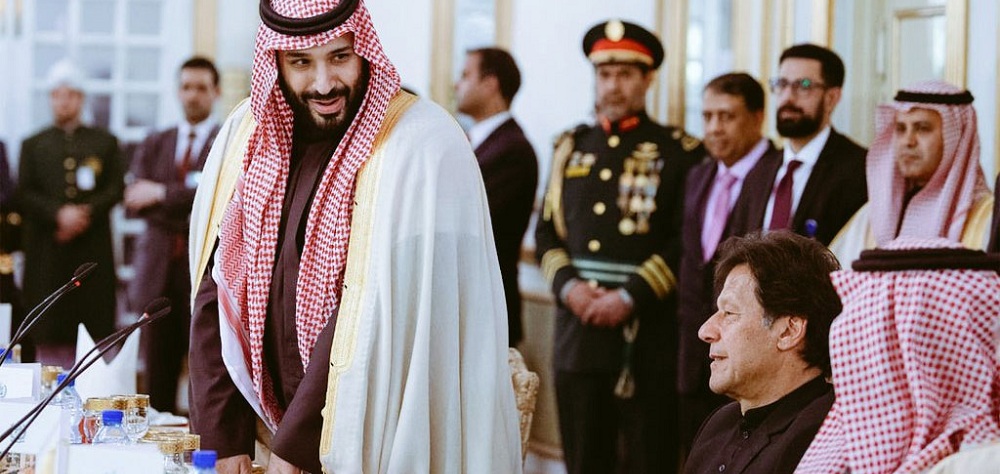Alwaght- The warm Saudi-Pakistani relations turned chilly sooner than it was expected. The chill in Riyadh-Islamabad showed itself when Saudi Arabia turned its back on Islamabad after Crown Prince Mohammed bin Salman refused to meet Pakistan's Army Chief General Qamar Javed Bajwa, who visited Riyadh to repair ties with Saudi Arabia last week.
This comes while the first foreign destination of the Pakistani Prime Minister Imran Khan was Saudi Arabia in September 2018. At the time, reports said that the Pakistani PM visited the oil-wealthy Arab kingdom to demand financial aids.
A second trip to Saudi Arabia was made by Imran Khan less than a year after his first trip in October, while many world leaders and businesspeople boycotted the meeting, dubbed Davos in the desert, in condemnation of bin Salman’s assassination of his critic Jamal Khashoggi at the Saudi consulate in Istanbul. Imran Khan was one of the rare top leaders to attend the investment summit.
During a visit to Pakistan in February, the crown prince signed with the Pakistanis economic agreements worth $20 billion, signaling that the ties between the two countries were moving fast to progress.
However, things dramatically changed over the past few months, to an extent that Prince Mohammed last week turned down a meeting with the visiting Pakistani army chief General Qamar Javed Bajwa.
How did heat turn into chill?
Since last year that Kashmir's cause returned to the surface and the Muslims there faced a crackdown from the Indian forces, Pakistan struggled to raise the Kashmir case at the level of the Muslim world. Despite hard efforts by the Pakistanis, the Saudis preferred to save their warm relations with India and refrain from any reaction or even condemnation of Kashmir incidents.
The Pakistani anger with the Saudi silence boiled over and Islamabad earlier this month lashed out at Saudi Arabia and the Organization of Islamic Cooperation (OIC) that is under Riyadh influence, calling the silence “unacceptable.”
Saudi Arabia earlier had grown pessimism about the rise of a new Islamic bloc against its influence. Its pessimism intensified when Pakistan, Turkey, Iran, Qatar, and Malaysia condemned India at the OIC conference for Kashmir developments and also the silence of some Muslim countries that identify themselves as heavyweight in the Muslim world.
The absentee of the conference was Saudi Arabia which did not find Malaysia a suitable place to hold the conference. Riyadh was worried about its isolation among such countries as Iran, Turkey, and Qatar and imagined that the conference was an effort to establish a new Islamic bloc countering its quest for hegemony in the Muslim world.
At the same time, the ties between Pakistan and Turkey, Saudi Arabia’s rival, grew warm. During a visit to Islamabad in late February, Turkish President Recep Tayyip Erdogan vowed to support Pakistan financially.
India was part of the multi-faceted fraying of relations between Riyadh and Islamabad. Following Kashmir's developments, the country signed an agreement with the Saudi oil company Aramco. At the time, Saudi Arabia showed that it did not care much about the Kashmir crisis.
Politics preferred over the economy
Deterioration of the Saudi-Pakistani relations showed that it is the politics not the economy and trade that affect the ties between them. At least so far, the politics have shown to heavier influencing their ties than the economy. To put it differently, Saudi Arabia wants Pakistan included in its regional coalition under the condition that it does not approach Iran, Qatar, Turkey, or Malaysia. This echoes the interventionist strategy Washington applies to relations with Riyadh.
It seems that the Saudis are duplicating the White House strategy with other countries in their foreign policy. But whether or not the Saudis have the power and weight to put strains on Pakistan is a question. Despite financial aids promises by the Saudis, the Pakistanis these days are interested to do more activity within the Iran-Turkey-Qatar coalition as they do not practically enjoy fruits of the Saudi pledges. Pakistan may not seek escalated tensions with the Arab kingdom, but the cold reception of the top Pakistani military commander in Riyadh demonstrates the lack of considerable Saudi value to warm relations with Pakistan.



























